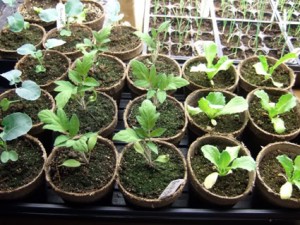Get a Jump on Spring Gardening
Being a gardening neophyte, I gathered all the information I could. So here's what I learned:
 While I envisioned trays of little pots sitting in all the sunny windows I could find, the most important things seeds need to germinate is water and heat. They will need light later when leaves develop, but to start with moisture and warmth are most important. There are seed-starting systems you can buy or you can build your own. The main things you need are:
While I envisioned trays of little pots sitting in all the sunny windows I could find, the most important things seeds need to germinate is water and heat. They will need light later when leaves develop, but to start with moisture and warmth are most important. There are seed-starting systems you can buy or you can build your own. The main things you need are:- Planting containers
- Planting medium
- A watering source
- Trays for the containers
- Glass or plastic to cover the trays
- Seeds
You also might want labels and markers to keep track of what you planted.
 The containers need to hold at least 1 to 2 inches of soil. Ones you can plant right in the garden, like those made out of peat or newspaper, are best as the least amount of disturbance to the roots, the better. The best planting medium is a mixture of compost and sphagnum moss with some vermiculite to hold moisture. Garden soil is not recommended because it's too heavy for delicate roots. Trays can be made out of wood scraps or, depending on the number of plants you want, you can even use a new cat litter pan, casserole dish or serving tray.
The containers need to hold at least 1 to 2 inches of soil. Ones you can plant right in the garden, like those made out of peat or newspaper, are best as the least amount of disturbance to the roots, the better. The best planting medium is a mixture of compost and sphagnum moss with some vermiculite to hold moisture. Garden soil is not recommended because it's too heavy for delicate roots. Trays can be made out of wood scraps or, depending on the number of plants you want, you can even use a new cat litter pan, casserole dish or serving tray.Organic Gardening recommends moistening the potting mix with warm water before you plant and allow it time to absorb the moisture. Plant large seeds about 1 inch apart and medium seeds 1 to 1/2 inches and fine seeds 1/2 inch. Cover them lightly with dry mix and water by setting the pots in water to soak for a time or misting the tops carefully. Check the seed packets, some seeds do need light to germinate. These you can pat gently into the soil instead of covering. Cover the trays with plastic or glass and store in a warm place. Check daily and at the first sign of sprouts bring them into the light.
 According to Farmer's Almanac the approximate average last spring frost date for the Topeka area is April 19. You can start onions, leeks, chives, pansies, and impatiens as early as 12 to 14 weeks before that date. Wait until 8 to 12 weeks before to start peppers, lettuce, cabbage, snapdragons, petunias and alyssum. Tomatoes and eggplant can be started 6 to 8 weeks before, zinnias and marigolds 5 to 6 weeks before and cucumbers, melons, okra and squash 2 to 4 weeks before.
According to Farmer's Almanac the approximate average last spring frost date for the Topeka area is April 19. You can start onions, leeks, chives, pansies, and impatiens as early as 12 to 14 weeks before that date. Wait until 8 to 12 weeks before to start peppers, lettuce, cabbage, snapdragons, petunias and alyssum. Tomatoes and eggplant can be started 6 to 8 weeks before, zinnias and marigolds 5 to 6 weeks before and cucumbers, melons, okra and squash 2 to 4 weeks before.Look for us at the Kansas Garden Show, February 13, 14 and 15 at the Kansas Expocentre.
The next Master Gardner presentation at the library is Practical Pruning Advice on February 19, 7:00 pm to 8:00 pm.













